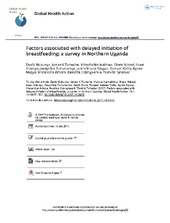| dc.contributor.author | Mukunya, David | en_US |
| dc.contributor.author | Tumwine, James K | en_US |
| dc.contributor.author | Nankabirwa, Victoria | en_US |
| dc.contributor.author | Ndeezi, Grace | en_US |
| dc.contributor.author | Odongo, Isaac | en_US |
| dc.contributor.author | Tumuhamye, Josephine | en_US |
| dc.contributor.author | Tongun, Justin Bruno | en_US |
| dc.contributor.author | Kizito, Samuel | en_US |
| dc.contributor.author | Napyo, Agnes | en_US |
| dc.contributor.author | Achora, Vincentina | en_US |
| dc.contributor.author | Odongkara, Beatrice | en_US |
| dc.contributor.author | Tylleskär, Thorkild | en_US |
| dc.date.accessioned | 2018-08-22T13:42:18Z | |
| dc.date.available | 2018-08-22T13:42:18Z | |
| dc.date.issued | 2017 | |
| dc.Published | Mukunya D, Tumwine JK, Nankabirwa V, Ndeezi G, Odongo, Tumuhamye J, Tongun, Kizito, Napyo, Achora, Odongkara, Tylleskär T. Factors associated with delayed initiation of breastfeeding: a survey in Northern Uganda. Global health action. 2017;10:1410975 | eng |
| dc.identifier.issn | 1654-9880 | |
| dc.identifier.uri | https://hdl.handle.net/1956/18198 | |
| dc.description.abstract | Background: Initiation of breastfeeding later than 1 hour after birth is associated with increased neonatal morbidity and mortality. Objective: To determine the prevalence and factors associated with delayed initiation of breastfeeding. Methods: We conducted a survey in 2016 of 930 children under the age of 2 years in Lira district, northern Uganda. Mothers of the children were interviewed and data was collected on mobile phones using Open Data Kit software (https://opendatakit.org). Multivariable logistic regression was used to determine factors associated with delayed initiation of breastfeeding. Results: Almost half [48.2%, 95% confidence interval (CI) (44.3–52.1)] of the mothers delayed initiation of breastfeeding. Factors significantly associated with delayed initiation of breastfeeding in multivariable analysis included caesarean delivery [Adjusted Odds Ratio (AOR) 11.10 95% CI (3.73–33.04)], discarding initial breast milk [AOR 2.02 95% CI (1.41–2.88)], home delivery [AOR 1.43 95% CI (1.04–1.97)] and mother being responsible for initiating breastfeeding as compared to a health worker or relative [AOR 1.73 95% CI (1.33–2.26)]. Mothers having a secondary education were less likely [AOR 0.54 95% CI (0.30–0.96)] to delay initiation of breastfeeding as compared to those with no education. Conclusion: About half the mothers delayed initiation of breastfeeding until after 1 hour after birth. Programs to promote, protect and support breastfeeding in this post conflict region are urgently needed. | en_US |
| dc.language.iso | eng | eng |
| dc.publisher | Taylor & Francis | eng |
| dc.rights | Attribution CC BY | eng |
| dc.rights.uri | http://creativecommons.org/licenses/by/4.0 | eng |
| dc.subject | Nutrition | eng |
| dc.subject | infant-feeding | eng |
| dc.subject | post-conflict | eng |
| dc.subject | breastmilk | eng |
| dc.subject | neonatal | eng |
| dc.title | Factors associated with delayed initiation of breastfeeding: a survey in Northern Uganda | en_US |
| dc.type | Peer reviewed | |
| dc.type | Journal article | |
| dc.date.updated | 2018-03-07T14:51:17Z | |
| dc.description.version | publishedVersion | en_US |
| dc.rights.holder | Copyright 2017 The Author(s) | |
| dc.identifier.doi | https://doi.org/10.1080/16549716.2017.1410975 | |
| dc.identifier.cristin | 1571224 | |
| dc.source.journal | Global health action | |

